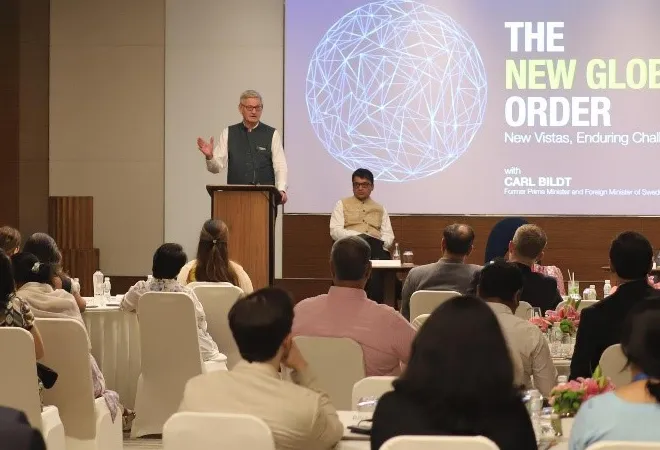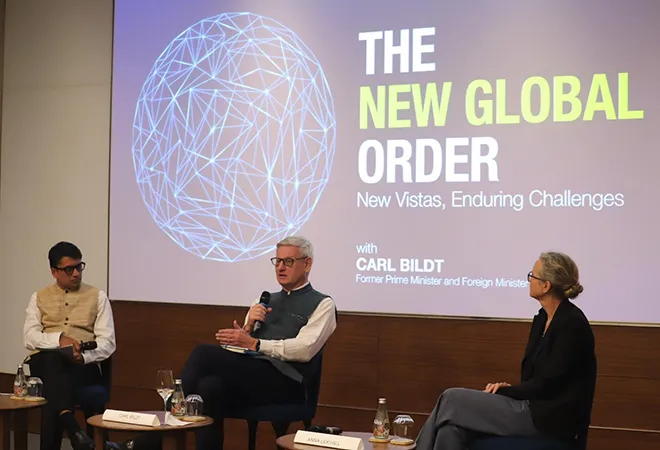Uncertainty and disorder created by the emergence of multiple ideological and developmental models characterise the evolving world order. The resulting disruptions have deepened power struggles and caused political polarisation and global power shifts, along with technology, trade, security, and trust concerns, creating long-standing challenges in this emerging global order. And while the post-COVID-19 global economy is limping back to normalcy, the ongoing Ukraine crisis has only exacerbated these challenges.
Against this chequered global backdrop, the Observer Research Foundation (ORF) organised an interactive session with Carl Bildt, former Prime Minister and Foreign Minister of Sweden, in Mumbai on 8 March 2023. Eminent business leaders and CEOs, diplomats, political leaders, authors, lawyers, and government officials attended this event.
Bildt highlighted the unfolding international geopolitical realignments affected by the
Russia-Ukraine war and the impact of China’s rise and great power rivalries, that have become more complicated because of grave concerns such as climate change, pandemic, and disruptive technology. "No nation or coalition of nations can beat them (the common challenges)," he remarked, hinting at the weakening global institutions. “Building bridges and alliances of necessary and possible cooperation to develop future technology and green energy and its equal access, fighting future pandemics and access to vaccines, helping Ukraine, and preventing tension in East Asia between the Americans and the Chinese, and a step-by-step approach to multilateral reforms” is the only way the world can navigate the current turbulence. Europe can be a reliable ally, a bridge. And India is a crucial player in this volatile scenario, especially given its increasing geopolitical and geo-economic global relevance, backed by strong domestic economic indicators and its ongoing G20 presidency.
The crisis in Ukraine is not just about borders or changing the regime in Kyiv but the idea of “getting rid of the country itself.” He praised the Ukrainians’ determination to fight for their independence despite the war severely impacting their economy and society. Europe stands firmly behind Ukraine and will continue to provide financial and humanitarian aid along with intelligence support, modern military equipment, and training of its armed forces. Europe’s continued support of Ukraine conveys the clear message that even as “Russia may win the war because of their military strength, but it will be defeated politically.”

Regarding India-European Union trade, Bildt pointed out that China accounts for 16 percent of the EU’s total trade. In comparison, India and the EU trade amounts to only about 2 percent. “Therefore, both sides must prioritise EU-India trade and strengthen it by establishing a Trade and Technical Council and a movement to support the trade chambers in India,” he emphasised.
In the engaging Q&A session that followed, Bildt talked about the obstacles to India-EU cooperation for signing a Free Trade Agreement, possible areas of convergence for the United Nations Sustainable Development Goals (SDGs), and further strengthening Sweden-India bilateral relationship. He remarked that there are “no impediments, but a lack of awareness”, and Sweden and India must further develop their relationship through trade, digitalisation and technological development, smart cities, and investment in start-ups to support the SDGs of inclusiveness and green impact. “Sweden, with its EU presidency, and India, with its G20 presidency, must work together to develop North-South cooperation,” he said.
Referring to Europe’s stance on the Indo-Pacific, he said that the region was always part of the EU’s focus. The war in Ukraine has shifted this focus to Eastern and Central Europe, with the promise of Ukraine becoming a member of the EU, and Finland and Sweden getting NATO membership. “However, the Indo-Pacific will always remain Europe’s critical focus area,” he said.
Responding to a question on pan-European nationalism, Bildt alluded that the European nations are small and therefore, “it is only by walking together they could achieve anything”. He stated that this reality was strongly reinforced by two things: The EU’s collective response to the Ukraine war and Brexit.
This report has been compiled by Saimaa Khan, Research Intern, and Dhaval Desai, Vice President, ORF Mumbai.
The views expressed above belong to the author(s). ORF research and analyses now available on Telegram! Click here to access our curated content — blogs, longforms and interviews.





 PREV
PREV

